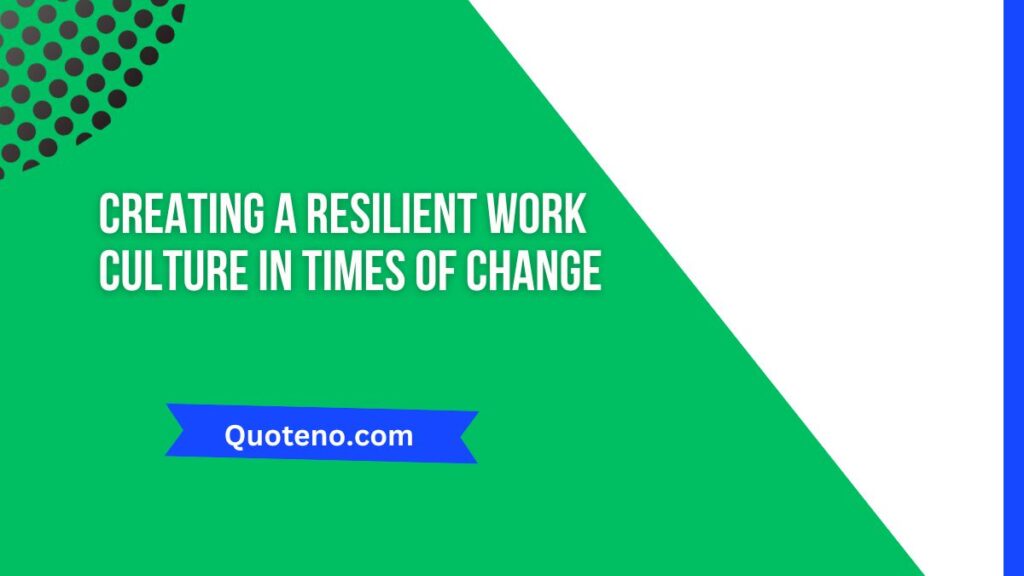In our rapidly evolving world, organizations face perpetual shifts—technological innovations, fluctuating market dynamics, and unpredictable global events. In such an environment, having a strategic plan isn’t enough. Organizations need a robust culture that doesn’t just withstand change but thrives amidst it. Such resilience, however, isn’t achieved through occasional motivational talks or superficial team-building activities.
It demands a more profound, systemic approach. This might include essential initiatives such as employee wellness retreats, comprehensive training programs, transparent communication channels, and cross-functional collaborations. Here’s how organizations can cultivate a genuinely resilient work culture.
Table of Contents
Understanding the Psychology of Change
Change, even if positive, often triggers apprehension. From an evolutionary standpoint, the known represents safety, while the unknown can signify a potential threat. This hardwired perspective sheds light on why employees might resist disruptions to the status quo.
To navigate this dilemma, leaders must learn how to empathize with these natural fears. Regular check-ins, personal conversations, and group discussions can help transform the employee mindset. Consequently, they can view change as an opportunity for growth instead of as a potential threat to their situation or wellbeing.
Embracing Transparent Communication
In periods of evolution, the absence of clear communication can lead to rampant rumors, speculation, and unrest. Transparent communication acts as a powerful countermeasure by fostering a two-way dialogue.
Leaders should articulate the motivations behind decisions, the anticipated results, and the challenges that might arise. Moreover, they should actively listen to their teams. By establishing platforms where employees can share concerns, ask questions, and offer insights, they cultivate a sense of ownership and collective responsibility toward the change. When employees feel they are a part of the journey rather than passive recipients of change, adapting becomes a team effort.
Investing in Continuous Training and Development
Adaptation often necessitates new skills. It is unrealistic to expect it without equipping employees with the required tools and knowledge. This is where focused training and development enter the fray. And it’s not just about imparting technical skills.
Soft skills are invaluable, especially those centered around adaptability, teamwork, and problem-solving. Workshops on critical thinking, team-based tasks, or sessions with industry experts can introduce fresh perspectives and approaches. Cultivating a proactive approach to skill enhancement prepares employees for imminent changes and instills a mindset of lifelong learning. This is a fundamental element of resilience.
Promoting Emotional Well-being
Historically, employers emphasized physical health, offering associated benefits and fitness programs. However, in a volatile environment, emotional well-being is paramount. Employees grappling with overwhelm, anxiety, or stress will inevitably struggle with resilience.
Organizations can mitigate this by providing intentional leadership retreats and counseling services that carve out safe spaces for candid mental health discussions.
Additionally, they can advocate for regular breaks to recharge. When leaders share their personal challenges and coping strategies, they humanize themselves and help destigmatize mental health discussions. Employees are more likely to open up and be more vocal about their challenges in a culture where emotional flexibility is celebrated. This will allow them to get the support they need to face their issues head-on.
Celebrating Small Wins
Reveling in incremental successes is crucial. Doing so not only uplifts morale but also underlines the idea that every step, regardless of how minute it is, can propel the organization forward. When employees internalize this perspective, resilience becomes second nature.
Nurturing Cross-Functional Collaboration
More often than not, silos can be detrimental to organizations. Cross-functional collaboration introduces diverse views, encourages innovative problem-solving, and builds a sense of unity. Companies and businesses can break down these divisions by creating mixed project teams or hosting inter-departmental activities. When employees understand and appreciate the broader organizational landscape, they are better equipped to navigate changes that impact various facets of the business.
Empowering Employee Autonomy
Allowing employees a degree of autonomy can empower them to think critically and out of the box. This doesn’t imply a lack of direction. Instead, it’s trusting employees to find solutions and make decisions within their realms of expertise. As a result, your team members may experience a boost of confidence and heightened morale. On top of that, you also get to promote a culture where individuals take personal ownership of challenges and their solutions. It’s pivotal for leaders to recognize that front-line employees often have insights into the practicalities of changes that higher-ups might overlook.
Prioritizing Feedback and Iteration
Continuous improvement is vital to resilience. Organizations that prioritize feedback —both from their employees and clientele—position themselves to preemptively address issues before they become significant problems. Open feedback channels, regular review sessions, and a company culture that values iterative improvement can lead to more agile and responsive business practices.
By viewing every project or initiative as an evolving prototype subject to refinement, organizations can stay ahead of the curve. This will also enable them to make the necessary course corrections as informed by real-world data and experiences.
Parting Thoughts
Cultivating a resilient work culture is a continuous endeavor. It requires trust, understanding, open communication, training, prioritization of well-being, a celebration of progress, and a collaborative spirit. In the face of change, such a culture becomes an organization’s strongest ally, strategically driving it toward innovation and growth.
- 5 Must-Visit Travel Destinations to Enrich Your Knowledge of History and Culture - May 17, 2024
- 5 Services Your Small Business Needs ASAP - May 13, 2024
- Maintaining Home Integrity: The Unseen Value of Gutters - May 13, 2024

